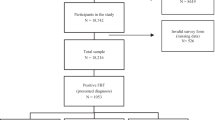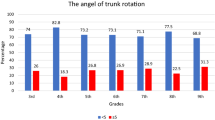Abstract
Cross-sectional epidemiologic scoliosis screening was carried out to determine the current prevalence of scoliosis in the Korean population and to compare with the results of previous studies. Between 2000 and 2008, 1,134,890 schoolchildren underwent scoliosis screening. The children were divided into two age groups, 10–12-year-olds (elementary school) and 13–14-year-olds (middle school), to calculate age- and sex-specific prevalence rates. Children with a scoliometer reading ≥5° were referred for radiograms. Two surgeons independently measured curve types, magnitudes, and Risser scores (inter-observer r = 0.964, intra-observer r = 0.978). Yearly and overall prevalence rates of scoliosis were calculated. There were 584,554 boys and 550,336 girls in the sample, with a male to female ratio of 1.1:1. There were 77,910 (6.2%) children (26,824 boys and 51,086 girls) with scoliometer readings >5°, and 37,339 of them had positive results with Cobb angles ≥10° (positive predictive value, 46.4%). The overall scoliosis prevalence rate was 3.26%; girls had a higher prevalence (4.65%) than boys (1.97%). Prevalence rates increased progressively from 1.66 to 6.17% between 2000 and 2008, with the exception of 2002. According to age and gender, 10–12-year-old girls had the highest scoliosis prevalence rates (5.57%), followed by 13–14-year-old girls (3.90%), 10–12-year-old boys (2.37%), and 13–14-year-old boys (1.42%). In girls and boys, prevalence rates dropped by 64.53 and 60.65% among 10–12-year-olds and 13–14-year-olds, respectively (P = 0.00). The proportion of 10°–19° curves was 95.25 and 84.45% in boys and girls, respectively; and the proportion of 20°–29° curves was 3.91 and 11.28%, which was a significant difference (P = 0.00). Thoracic curves were the most common (47.59%) followed by thoracolumbar/lumbar (40.10%), double (9.09%), and double thoracic (3.22%) curves. A comparison of the curve patterns revealed significant differences between genders (P = 0.00). We present this report as a guide for studying the prevalence of idiopathic scoliosis in a large population, and the increasing trend in the prevalence of idiopathic scoliosis emphasizes the need for awareness.


Similar content being viewed by others

References
American Academy of Pediatrics (1988) Guidelines for health supervision. II. American Academy of Pediatrics, Elk Grove Village
Scoliosis Research Society (1986) Scoliosis: a handbook for patients. Scoliosis Research Society, Park Ridge
Brooks HL, Azen SP, Gerberg E, Brooks R, Chan L (1975) Scoliosis: a prospective epidemiological study. J Bone Joint Surg Am 57:968–972
Bunnell W (1984) An objective criterion for scoliosis screening. J Bone Joint Surg Am 66:1381–1387
Bunnell WP (2005) Selective screening for scoliosis. Clin Orthop Relat Res 40–45
Burwell R, James N, Johnson F, Webb J, Wilson Y (1983) Standardised trunk asymmetry scores. A study of back contour in healthy school children. J Bone Joint Surg Br 65:452–463
Daruwalla JS, Balasubramaniam P, Chay SO, Rajan U, Lee HP (1985) Idiopathic scoliosis. Prevalence and ethnic distribution in Singapore schoolchildren. J Bone Joint Surg Br 67:182–184
Dickson R (1983) Scoliosis in the community. Br Med J 19:615–618
Dommisse G (1970) The management of scoliosis. S Afr Med J 44:1331–1335
Figueredo U, James J (1981) Juvenile idiopathic scoliosis. J Bone Joint Surg [Br] 63:61–66
Goldberg C, Moore D, Fogarty E, Dowling F (2008) Scoliosis: a review. Pediatr Surg Int 24:129–144
Goldberg CJ, Dowling FE, Fogarty EE (1993) Adolescent idiopathic scoliosis—early menarche, normal growth. Spine (Phila Pa 1976) 18:529–535
Gore D, Passehl R, Sepic S, Dalton A (1981) Scoliosis screening: results of a community project. Pediatrics 67:196–200
Green M (1994) Bright Futures: guidelines for health supervision of infants, children, and adolescents. National Center for Education in Maternal and Child Health, Arlington, VA
Grivas T, Vasiliadis E, Moizakis V, Mihas C, Koufopoulos G (2006) Association between adolescent idiopathic scoliosis prevalence and age at menarche in different geographic latitudes. Scoliosis 1:9
Grossman T, Mazur J, Cummings R (1995) An evaluation of the Adams forward bend test and the scoliometer in a scoliosis school screening setting. J Pediatr Orthop 15:535–538
Huang S (1997) Cut-off point of the scoliometer in school scoliosis screening. Spine 22:1985–1989
Katz D (2000) A population-based study of school scoliosis screening. Phyl Ther 80:315
Katz D, Durrani A (2001) Factors that influence outcome in bracing large curves in patients with adolescent idiopathic scoliosis. Spine 26:2354–2361
Koukourakis I, Giaourakis G, Kouvidis G, Kivernitakis E, Blazos J, Koukourakis M (1997) Screening school children for scoliosis on the island of Crete. J Spinal Disord 10:527–531
Laulund T, Sojbjerg J, Horlyck E (1982) Moire topography in school screening for structural scoliosis. Acta Orthop Scand 53:765–768
Lee CF, Fong DY, Cheung KM, Cheng JC, Ng BK, Lam TP, Mak KH, Yip PS, Luk KD (2010) Costs of school scoliosis screening: a large, population-based study. Spine (Phila Pa 1976). doi:10.1097/BRS.0b013e3181cbcc10
Lonstein J, Carlson J (1984) The prediction of curve progression in untreated idiopathic scoliosis during growth. J Bone Joint Surg [Am] 66:1061–1071
Lonstein JE, Bjorklund S, Wanninger MH, Nelson RP (1982) Voluntary school screening for scoliosis in Minnesota. J Bone Joint Surg Am 64:481–488
Morais T, Bernier M, Turcotte F (1985) Age- and sex-specific prevalence of scoliosis and the value of school screening programs. Am J Public Health 75:1377–1380
Morrissy RT (1999) School screening for scoliosis. Spine (Phila Pa 1976) 24:2584–2591
Nissinen M, Heliovaara M, Ylikoski M, Poussa M (1993) Trunk asymmetry and screening for scoliosis: a longitudinal cohort study of pubertal schoolchildren. Acta Paediatr 82:77–82
Ohtsuka Y, Yamagata M, Arai S, Kitahara H, Minami S (1988) School screening for scoliosis by the Chiba University Medical School screening program. Results of 1.24 million students over an 8-year period. Spine (Phila Pa 1976) 13:1251–1257
Pin LH, Mo LY, Lin L, Hua LK, Hui HP, Hui DS, Chang BD, Chang YY, Yuan L (1985) Early diagnosis of scoliosis based on school-screening. J Bone Joint Surg Am 67:1202–1205
Reamy B, Slakey J (2001) Adolescent idiopathic scoliosis: review and current concepts. Am Fam Physician 64:111–116
Renshaw T (1988) Screening school children for scoliosis. Clin Orthop 229:26–33
Roach J (1999) Adolescent idiopathic scoliosis. Orthop Clin North Am 30:353–365
Rogala EJ, Drummond DS, Gurr J (1978) Scoliosis: incidence and natural history. A prospective epidemiological study. J Bone Joint Surg Am 60:173–176
Soucacos P, Zacharis K, Gelalis J, Soultanis K, Kalos N, Beris A, Xenakis T, Johnson E (1998) Assessment of curve progression in idiopathic scoliosis. Eur Spine J 7:270–277
Soucacos PN, Soucacos PK, Zacharis KC, Beris AE, Xenakis TA (1997) School-screening for scoliosis. A prospective epidemiological study in northwestern and central Greece. J Bone Joint Surg Am 79:1498–1503
Span Y, Robin G, Makin M (1976) Incidence of scoliosis in schoolchildren in Jerusalem: proceedings of the Israeli Orthopaedic Society. J Bone Joint Surg Br 58:379
Stirling AJ, Howel D, Millner PA, Sadiq S, Sharples D, Dickson RA (1996) Late-onset idiopathic scoliosis in children six to fourteen years old. A cross-sectional prevalence study. J Bone Joint Surg Am 78:1330–1336
Strayer L (1973) The incidence of scoliosis in post-partum female on Cape Cod. J Bone Joint Surg Am 55A:436
Weiss H, Weiss G, Schaar H (2003) Incidence of surgery in conservatively treated patients with scoliosis. Pediatr Rehabil 6:111–118
Whitby L (1974) Screening for disease: definitions and criteria. Lancet 2:819–824
Williams J (1988) Criteria for screening: are the effects predictable. Spine 13:1178–1186
Willner S, Uden A (1982) A prospective prevalence study of scoliosis in Southern Sweden. Acta Orthop Scand 53:233–237
Wong H, Hui J, Rajan U, Chia H (2005) Idiopathic scoliosis in Singapore schoolchildren: a prevalence study 15 years into the screening program. Spine 30:1188–1196
Wong HK, Balasubramaniam P, Rajan U, Chng SY (1997) Direct spinal curvature digitization in scoliosis screening–a comparative study with Moire contourgraphy. J Spinal Disord 10:185–192
Yawn B, Yawn R, Hodge D, Kurland M, Shaughnessy W, Ilstrup D, Jacobsen S (1999) A population-based study of school scoliosis screening. JAMA 282:1472–1474
Yawn BP, Yawn RA (2000) The estimated cost of school scoliosis screening. Spine (Phila Pa 1976) 25:2387–2391
Zhang G, Li Z, Wei X et al (1988) Screening for scoliosis among schoolchildren in Beijing. Chin Med J 101:151–155
Author information
Authors and Affiliations
Corresponding author
Rights and permissions
About this article
Cite this article
Suh, SW., Modi, H.N., Yang, JH. et al. Idiopathic scoliosis in Korean schoolchildren: a prospective screening study of over 1 million children. Eur Spine J 20, 1087–1094 (2011). https://doi.org/10.1007/s00586-011-1695-8
Received:
Revised:
Accepted:
Published:
Issue Date:
DOI: https://doi.org/10.1007/s00586-011-1695-8



